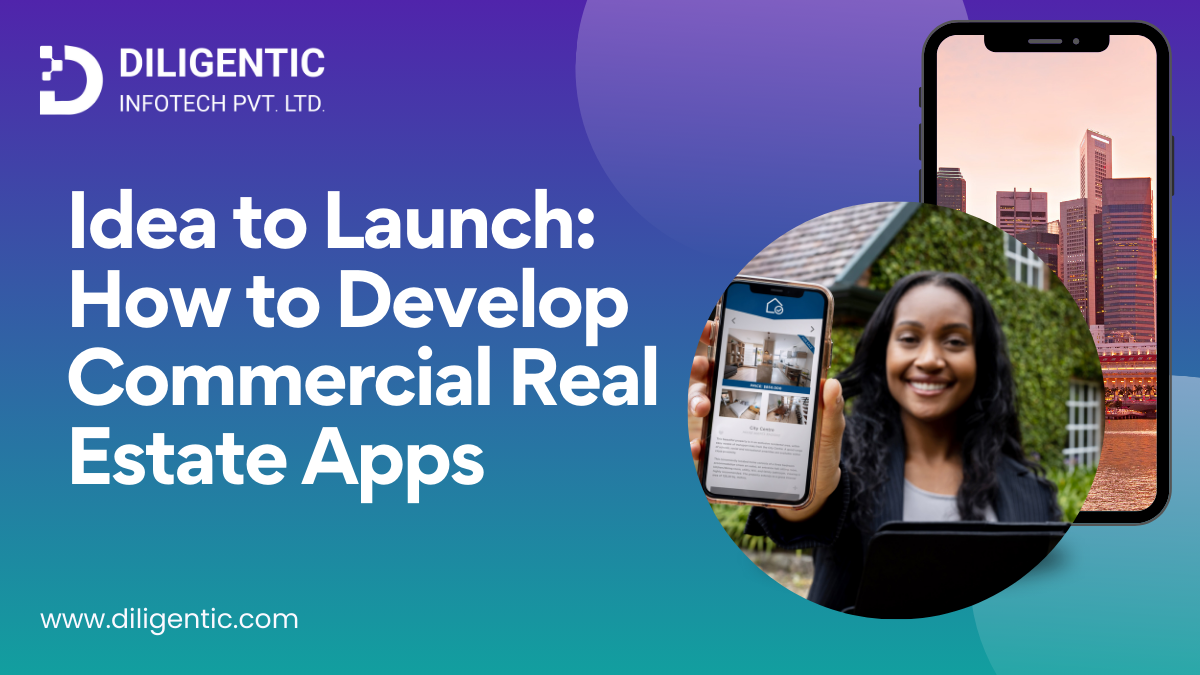SHARE

Idea to Launch: How to Develop Commercial Real Estate Apps (Complete Guide)

Why Launch a Commercial Real Estate App?
Commercial real estate apps turn complex transactions into straightforward processes, helping property management companies, brokers, and investors work more efficiently, comply with regulations, and adapt to market changes in real time. This guide covers the whole development journey, current trends, must-have features, cost factors, and real-world use cases, so users can make informed decisions and avoid the missteps that frequently ruin new app projects.
Table of Contents
How Commercial Real Estate Apps Add Real Business Value

A modern app for commercial real estate goes far beyond property listings or basic messaging. Top solutions feature integrations for lease and contract management, financial analytics, asset tracking, and virtual site visits, all built for the day-to-day needs of real estate professionals.
- Instant Listings: Access thousands of properties, search by location, asset type, cap rate, and tenant profile.
- Real-Time Analytics: Monitor market shifts, rental income, and ROI instantly from anywhere.
- Secure Transactions: Support for digital contracts, electronic signatures, and encrypted payment processing.
- Virtual Tours: Save hours by letting clients view properties remotely through video walkthroughs or AR overlays.
- Portfolio/Asset Management: Track building performance, maintenance tasks, and lease renewals with one dashboard.
Real-World Example
MRI Software lets property managers integrate accounting, leasing, and compliance, all on a single platform. Its predictive analytics feature shows how much lease extensions or new tenants are likely to affect revenues, giving brokers a real edge.
Unique Challenges in Developing a Commercial Real Estate App
Building commercial real estate apps is more complex than building residential apps. Users expect advanced search filters, integrated financial tools, CRM workflows, and secure multi-user access.
- Regulatory Compliance: Lease management must stick to laws and local mandates.
- Scalability: Handle thousands of listings and users without losing speed.
- Integration Needs: Connect with ERP, CRM, property management, and finance systems commonly used by property management companies.
- Data Privacy: Transactions involve sensitive contract and payment info and must meet strict security standards.
Essential Features of Successful Commercial Real Estate Apps

When users choose between platforms, details matter. According to recent surveys, the most valued features are:
- Advanced Property Search: By region, asset class, size, cap rate, tenant mix, and market trends.
- CRM Integration: Capture leads, automate follow-ups, and organize client relationships.
- Document Management & E-Signatures: Streamlined process for deal closure and compliance.
- Interactive Maps & AR Virtual Tours: Enable users to visualize properties remotely or overlay stats during site visits.
- Secure Payment Systems: Rent, deposit, and commissions processed safely using encrypted gateways.
- Reporting & Analytics: Generate market snapshots, financial summaries, and trend analyses for better decision-making.
- Notifications & Alerts: Get updates on new listings, expiring leases, and market price shifts in real time.
- User Roles & Permissions: Assign access for brokers, property managers, investors, and tenants.
Feature Comparison Table
| Feature | Commercial Real Estate Apps | Residential Real Estate Apps |
|---|---|---|
| Target Users | Property managers, investors | Buyers, renters |
| Listings Complexity | Advanced filters (cap rates, tenants) | Simple property search |
| Marketing/Lead Generation | Analytics & CRM integration | Often basic notifications |
| Document Management | Legal, lease, compliance workflows | Limited contracts |
| Financial Tools | ROI, mortgage, custom calculations | Standard payment options |
| Integration | ERP/CRM, accounting systems | Seldom integrates with external systems |
| AI & AR Features | Virtual tours, predictive analytics | Basic image galleries |
| Transaction Volumes | Large-scale, recurring | One-time, lower volume |
Development Steps: Idea to Market Launch
A professional approach follows structured, quick, flexible development, avoiding the unnecessary features and delays that trouble many newcomers.
1. Ideation & Business Strategy
- Speak to stakeholders, including brokers, agents, property managers, and tenants, to pinpoint pain points.
- Analyze competing commercial real estate apps: What features help or restrict user goals? Fill gaps left by others.
- Define clear business goals: Is the focus on rental management, investment analysis, or broker sales?
2. Market Research & Validation
- Evaluate top platforms like Buildium, MRI Software, and Reonomy for feature gaps and innovation opportunities.
- Study regulatory requirements for contracts and leasing in target markets.
3. Feature Definition & Monetization Planning
- Build a Minimum Viable Product (MVP) including property search, messaging, CRM basics, and document workflows.
- Plan revenue: subscription models, ad placements, paid listings, commissions, or integrations with partner services.
4. Tech Stack Selection
- Use cross-platform tools (Flutter, React Native), robust backend (Node.js, Django), and secure cloud hosting (AWS, Google Cloud).
- Integrate third-party APIs for payment gateways, map services, and AI analytics.
5. UI/UX Design Process
- Map the user journey: simple workflows from search to lease signing.
- Create interactive prototypes and wireframes for testing with real users.
- Prioritize accessibility and inclusive design so all stakeholders can participate.
6. Agile Development & Testing
- Develop in sprints, collaborate with a reputable real estate app development company for backend and frontend builds.
- Rigorously test usability, performance, security, and compliance.
- Gather feedback from beta testers within local property management companies or brokerage networks.
7. App Store Prep & Strategic Marketing
- Prepare App Store Optimization (ASO): write engaging, keyword-rich descriptions, select sharp visuals, and optimize keywords for “commercial real estate apps,” “property management companies,” “real estate app development company,” etc.
- Launch coordinated outreach via social media, partner websites, email campaigns, and virtual events for investor groups.
8. Post-Launch Maintenance and Growth
- Monitor analytics, respond to user reviews, and release frequent updates with feature improvements and bug fixes.
- Expand integrations with CRM, accounting, analytics, and marketing tools as user needs evolve.
Trending Innovations in Commercial Real Estate App Development

- AI-Powered Property Matching: Predicts user preferences and recommends listings, improving conversion rates and user satisfaction.
- Blockchain for Smart Contracts: Offers tamper-proof leasing and purchasing, streamlining compliance and trust.
- AR/VR Virtual Site Inspections: Let tenants and investors walk through properties virtually, shortening decision cycles.
- Big Data Analytics: Helps companies anticipate market shifts and optimize asset management for higher returns.
- Chatbots: Enable 24/7 support, capture leads instantly, and answer routine queries within apps.
Mistakes to Avoid—and What Others Don’t Tell You
- Skipping User Testing: Real feedback from brokers and tenants highlights features to improve before launch.
- Ignoring Accessibility: Not all apps are easy for older or differently abled users; design inclusively.
- Avoiding Scalability: A common failure is launching with a small server capacity, only to crash during peak market times.
How to choose a real estate app development company
When shortlisting a real estate app development company, use the same care you’d apply to a building contractor:
- Pilot first. Ask for a scoped pilot in one asset with success criteria tied to response time, first-action rate, and week-4 retention.
- Integration depth. Request proof of live integrations with your accounting and access control stack, not just slide decks.
- Mobile reality. Confirm offline support for basements and MEP rooms; verify crash reporting and alerting.
- Data governance. Who owns tenant usage and sentiment data? Where is it stored? How long is it kept?
- Service design. Ask for an adoption plan: QR codes at entry points, onsite installation help, and simple incentives during the first week.
Conclusion: Let’s Build Your Commercial Real Estate App
From initial concept to successful launch, a commercial real estate app demands focus, creativity, and an understanding of user needs, business goals, and industry demands. Don’t settle for basic solutions; work with a team that prioritizes smart feature choices, strong integrations, and ongoing support.
Ready to create a platform that moves your property business forward? Let’s talk to Diligentic Infotech and start your journey with experts who understand both technology and the real estate business.
FAQ’s
How long does it take to build a commercial real estate app?
A basic app can be developed in 3–4 months, but advanced features may extend the timeline to 8+ months.
What features matter most in commercial real estate apps?
Advanced search, property analytics, secure payments, CRM integration, AR/VR tours, document management, and role-based access.
Which property management companies benefit most?
Firms handling large portfolios, brokers focused on multipoint leasing, and agencies in fast-paced urban markets.
What should be prioritized for App Store ranking?
User-centric feature descriptions, rich visuals, and compliance with App Store algorithms (keyword density, fast performance, accessibility).
How can an app be made truly user-friendly?
Test with different user groups, prioritize intuitive UX, give clear feedback, and plan for quick troubleshooting and updates.
Engage with our experts
Subscribe to our newsletter!
Be the first to get exclusive offers and the latest news.
Posted on 5 Dec 2025
Why Super Apps Are Becoming the Next Big Shift in Mobile Tech in 2026
Super Apps are the next big shift in mobile tech because users prefer a single place for services rather than juggling dozens of apps. Brands want lower acquisition costs and stronger retention. Advances in AI, payments, authentication, and mini-app frameworks make it easier for a single platform to host multiple services.
Posted on 15 Nov 2025
Best Mobile App Development Company in Calgary | Build Powerful Apps That Perform
If you’re looking for a top-tier mobile app development company in Calgary to build a powerful, high-performing app, you need a partner that offers full stacks of mobile app development services, understands the Canadian market, and is comfortable with custom mobile app development company workflows.
Posted on 21 Oct 2025
Android App Bundle: 10 Compelling Reasons Every Business Should Choose It
When a company decides to build an Android app, an early strategic decision is how to package and publish it. For years, developers used APK (Android Package Kit). But Google introduced the Android App Bundle format and, over time, made it the required format on Google Play.

Reach out
Let’s Start Together
We're a collective of high caliber designers, developers, creators, and geniuses. We thrive off bouncing your ideas and opinions with our experience to create meaningful digital products and outcomes for your business.
Phone Number
+1 (825) 760 1797
hello[at]diligentic[dot]com
